Understanding Freezer Morgues: Essential Preservation Technology
When it comes to dignified care for the deceased, temperature control is everything. A freezer morgue is more than just a cold storage unit—it's specialized preservation technology designed with a specific purpose: maintaining human remains at temperatures well below freezing, typically between -10°C and -20°C (-4°F to -14°F).
Unlike their cousins, standard morgue refrigerators that run at a chilly but above-freezing 1-5°C (34-41°F), freezer morgues take preservation to another level. By dropping temperatures into the sub-zero range, these specialized units dramatically slow decomposition processes, essentially pressing the pause button on nature's timeline.
At American Mortuary Coolers, we've seen how freezer morgues serve critical roles across the death care spectrum. Funeral homes appreciate them for flexibility in scheduling services. Hospitals rely on them during high-volume periods. Medical examiners and forensic facilities depend on them to preserve evidence integrity over extended investigations. And during disaster response situations—whether pandemic surges or mass casualty events—these units become absolutely essential infrastructure.
The science is straightforward: sub-zero environments effectively halt the enzymatic processes and bacterial growth that cause decomposition. This buys precious time for families to make arrangements, for investigators to complete their work, or for facilities to manage capacity during overwhelming circumstances.
When considering whether your facility needs a freezer morgue rather than a standard cooler, the decision typically hinges on three factors: how long you need to preserve remains, your available space, and your operational budget. While freezers cost more to run than standard refrigeration, they offer best long-term preservation capabilities that simply can't be matched by conventional cooling.
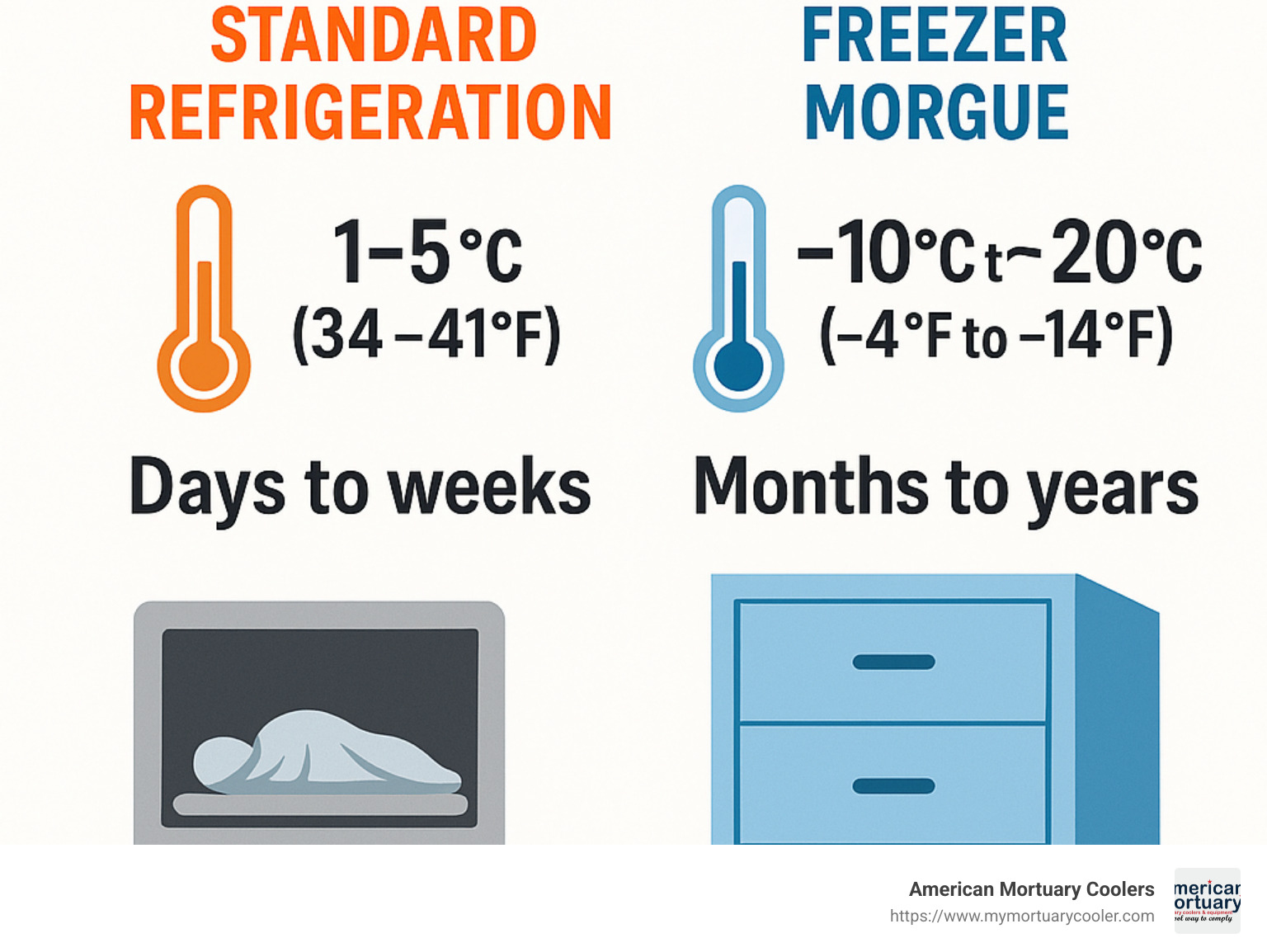
Our team at American Mortuary Coolers brings national-level expertise in freezer morgue installation and customization. We've worked with facilities of all sizes—from small rural funeral homes to major metropolitan medical centers—helping professionals select systems that balance preservation needs with practical operational considerations.
Whether you're looking at walk-in units that can accommodate 5-50 bodies, compact upright cabinets designed for 1-6 deceased, or mobile solutions for temporary needs, we understand that this equipment represents both a significant investment and a sacred trust.
Find more about freezer morgue:
Freezer Morgue 101: Definition & Key Differences
When folks ask us about a freezer morgue, they're usually trying to understand how it differs from standard mortuary refrigeration. After helping hundreds of facilities make this important decision, I've learned that understanding these differences isn't just technical—it affects dignity, preservation time, and ultimately how well you can serve families in difficult moments.
A freezer morgue (sometimes called a cadaver freezer or body box) operates at temperatures well below freezing, typically between -10°C and -20°C. This extreme cold does something remarkable—it essentially pauses decomposition by freezing tissues and halting bacterial activity. It's like pressing a preservation "pause button" that standard refrigeration simply can't match.
During my visits to facilities across the country, I've noticed how this distinction became critically important during the pandemic. One funeral director in Louisiana told me, "We thought our standard coolers would be enough, but when our community was hit hard, only our freezer morgue gave us the flexibility we desperately needed."
Freezer morgue vs mortuary refrigerator
The differences between these two preservation methods go far beyond just temperature settings:
| Feature | Freezer Morgue | Mortuary Refrigerator |
|---|---|---|
| Temperature | -18°C (0°F) or colder | 1°C to 5°C (34°F to 41°F) |
| Preservation Time | Months to years | Days to weeks |
| Energy Usage | Higher | Lower |
| Initial Investment | 25-40% more | More budget-friendly |
| Body Capacity | 1-50+ (model dependent) | 1-50+ (model dependent) |
| Primary Use | Long-term storage, evidence preservation | Short-term storage before services |
| Interior Material | Heavy-duty stainless steel | Stainless steel or aluminum |
| Cooling System | Often dual compressors with backup | Single compressor system |
Quality freezer morgues feature stainless steel interiors that withstand the stress of temperature fluctuations during defrost cycles. We insist on 304-grade stainless in all our freezer units—it's simply the best material for maintaining sanitary conditions while handling the extreme cold.
One funeral director in Texas joked with me, "This stainless interior cleans up so nicely, I could practically serve dinner in here!" (Though I certainly wouldn't recommend that!)
Standard morgue cooler limitations
While standard coolers work perfectly for many situations, they do have limitations worth considering:
First, they only provide a narrow autopsy window. Standard refrigeration merely slows decomposition rather than stopping it completely. This typically gives medical examiners about 3-7 days for procedures, whereas a freezer morgue extends this window significantly—sometimes by months.
Second, odor control becomes increasingly challenging with standard refrigeration. As a medical examiner in Florida told me, "In our climate, even with good refrigeration, we were fighting a constant battle against odors after a few days. Our new freezer morgue solved that problem completely."
Finally, temperature consistency can be an issue in standard coolers, especially with frequent door openings. Modern freezer morgues often feature individual chambers with precise temperature control, ensuring every space maintains the exact preservation environment needed.
I recently spoke with a county coroner who switched to our freezer system. She explained, "Before, we were constantly adjusting our standard cooler during summer heat waves. Now with our freezer morgue, we set it and forget it—and we can keep remains in perfect condition until families are ready, no matter how long that takes."
The right choice between refrigeration and freezing ultimately depends on your specific needs—but understanding these fundamental differences is the first step toward making that important decision.
Temperature & Preservation Science
The science behind freezer morgue technology centers on the relationship between temperature and biological processes. At sub-zero temperatures, the cellular activity that drives decomposition essentially halts, creating an environment where remains can be preserved for extended periods.
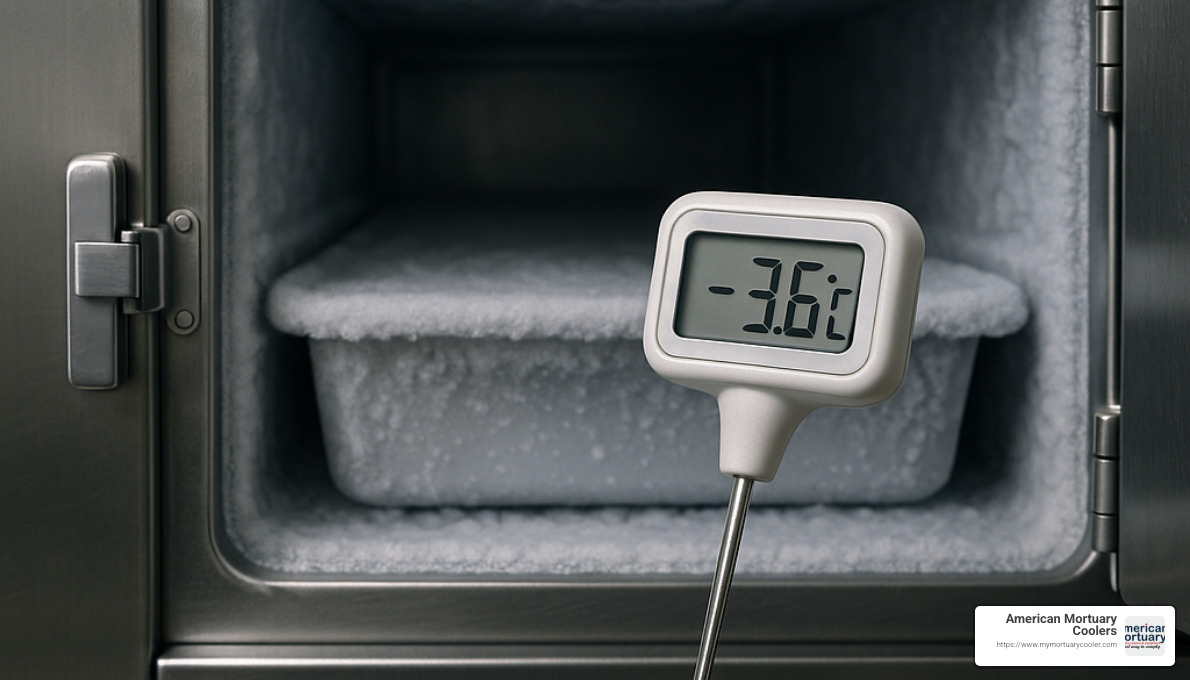
Most professional freezer morgues maintain temperatures between -10°C and -30°C (-4°F to -22°F), with the specific setting determined by your facility's needs and protocols. When we talk with customers at American Mortuary Coolers, we explain how this extreme cold works its preservation magic in several ways.
First, the enzymatic processes that normally break down tissues after death simply can't function in this frozen environment. It's like pressing pause on nature's decomposition timeline. At the same time, bacterial growth—a major driver of decomposition—comes to a standstill when temperatures drop below freezing.
The formation of ice crystals throughout the tissues also plays a key role, as these crystals prevent the movement of water molecules necessary for decomposition reactions. Modern freezer morgues don't just control temperature, though—they also manage humidity levels to prevent tissue dehydration while maintaining the proper frozen state.
"What surprises many of our customers," says our lead technician, "is how sophisticated today's monitoring systems have become." The units we provide at American Mortuary Coolers feature advanced alarm systems that keep constant watch over temperature conditions, including high and low temperature alerts that can send notifications to your phone. Our dual compressor systems provide peace of mind through redundancy—if one system hiccups, the other keeps things running smoothly.
We also include backup battery power that maintains alarm functionality for up to 72 hours during power outages, along with easy-to-read digital displays for real-time monitoring. As scientific research on cold preservation has shown, even small temperature shifts can significantly impact preservation duration, making these monitoring features essential, not just nice-to-have extras.
Why bodies need sub-zero storage
There are several scenarios where standard refrigeration just won't cut it, and sub-zero freezer morgue storage becomes necessary.
When it comes to forensic evidence preservation, freezing can be crucial. A forensic pathologist who works with our Chicago customers recently told me, "Freezer storage allows us to preserve evidence exactly as it was found, sometimes for months or years while investigations proceed." That kind of long-term preservation simply isn't possible with standard refrigeration.
Timing challenges around tissue donation occasionally require extended preservation periods that only freezing can provide. And when legal holds delay disposition or identification proves difficult—as happened frequently during the pandemic—freezer morgues provide the extended preservation window needed to handle these sensitive situations with dignity.
Medical schools and research institutions often need long-term preservation capabilities for educational specimens. And in our increasingly global world, international transportation of remains sometimes involves complex logistics and delays, making freezer storage the only viable option to ensure bodies remain properly preserved throughout extended transit periods.
How long can a body stay in a freezer morgue?
This is probably the question we hear most often at American Mortuary Coolers. The answer depends on several factors, but the contrast with standard refrigeration is striking. While regular coolers typically preserve remains for just 3-7 days, a properly maintained freezer morgue can preserve bodies for months or even years.
For most forensic and delayed funeral scenarios, short-term freezing of 1-3 months provides ample time. Medium-term freezing (3-12 months) comes into play for extended investigations or challenging identification situations. Long-term freezing beyond a year is primarily reserved for research purposes or special legal circumstances.
Several factors influence how long effective preservation lasts. Body mass index matters—larger bodies with higher fat content may need lower temperatures or more careful monitoring. Pre-existing medical conditions can sometimes accelerate decomposition even in frozen environments. And proper wrapping using moisture-barrier materials makes a significant difference in preservation quality.
Temperature stability is absolutely critical—even brief fluctuations can impact long-term results. That's why our freezer morgues include redundant systems and alerts. The condition of remains when placed in the freezer also significantly affects outcomes, which is why timely transfer to cold storage remains important.
Unlike some refrigeration scenarios, embalming is completely optional before freezer storage. In fact, many forensic facilities specifically avoid embalming to preserve evidence in its original state.
"The freezer morgue is really about buying time when needed," explains our company founder. "Whether that's time for family members to travel across country, time for investigations to proceed properly, or time to manage capacity during extraordinary circumstances like we saw in 2020, these systems provide that crucial window while maintaining the dignity of the deceased."
Types & Configurations of Freezer Morgues
The freezer morgue world offers a variety of options to fit different needs, spaces, and budgets. At American Mortuary Coolers, we've installed everything from compact units in crowded New York City facilities to expansive systems for sprawling medical examiner offices on the West Coast.
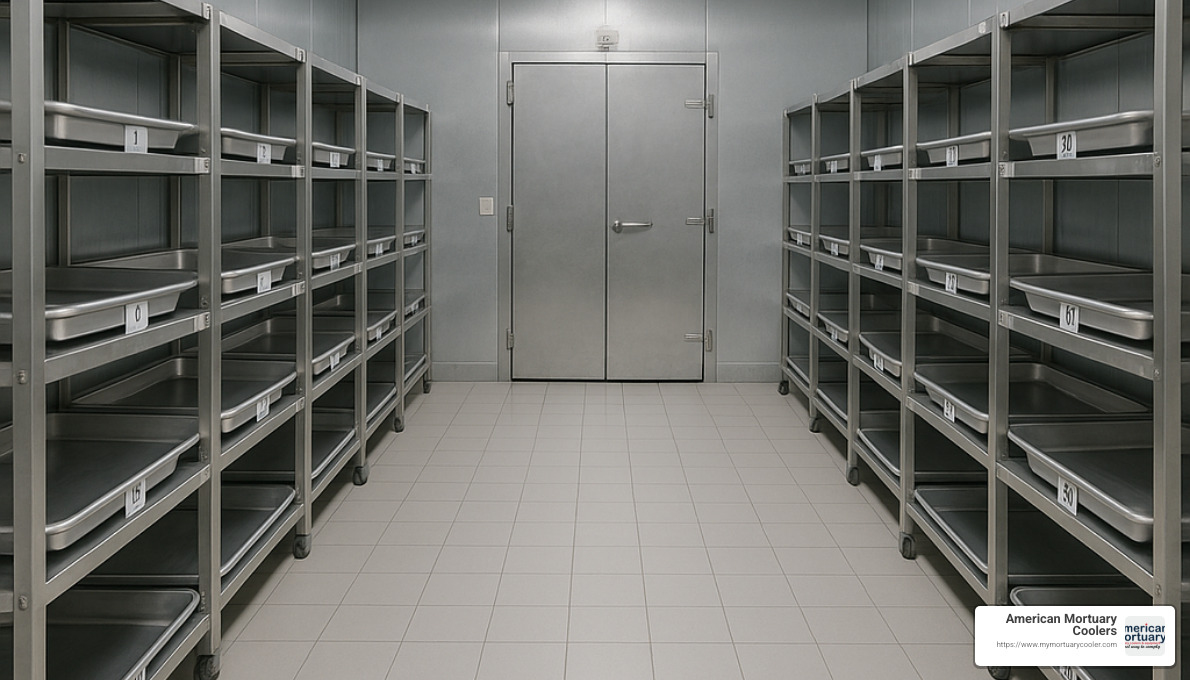
Let's explore the main types you'll encounter when shopping for a freezer morgue. Upright cabinet freezers look similar to commercial refrigerators but come specially reinforced with morgue-specific features like strengthened shelving and body trays. These standalone units typically hold between 1-6 bodies and work well for smaller facilities.
Walk-in panel freezers offer a more customizable solution. Built from modular insulated panels, we can design these rooms to virtually any size you need. Our most popular models comfortably accommodate 5-50 bodies while making smart use of available floor space. The modular nature means they can grow with your facility.
When disaster strikes or temporary capacity is needed, mobile trailer freezers provide rapid deployment options. These self-contained units proved invaluable during the pandemic and include generator connections for independent operation when needed. They're essentially morgues-on-wheels.
For facilities wanting to maximize existing space, modular rack systems allow you to organize bodies efficiently within your current freezer area. Our cantilever shelving eliminates those annoying support posts that get in the way during body transfers.
We also offer bariatric roll-in freezers designed specifically for larger individuals. These specialized units feature reinforced floors, wider doors, and heavy-duty cooling systems that handle the additional thermal mass with ease.
All our freezer morgue units use materials that meet or exceed industry standards – NSF-approved panels for proper sanitation, scalable systems for future growth, and heavy-duty stainless steel interiors that make cleaning and disinfection straightforward.
Mobile freezer morgue units for mass casualties
COVID-19 taught us all hard lessons about morgue capacity. When mortality rates suddenly spike, mobile freezer morgue units become essential infrastructure.
These units offer remarkable flexibility – they can be delivered and fully operational within 24-48 hours, run independently with onboard generators or standard power connections, and can be scaled up by deploying multiple units together. Best of all, they require no permanent modifications to your facility.
At American Mortuary Coolers, we offer rental options for temporary mortuary coolers and freezers to meet all your emergency cold storage needs.
During the pandemic's darkest days, we provided mobile solutions to hospitals throughout the Midwest and Northeast. Many facilities told us these units were lifesavers – literally – as they managed unprecedented demand. These mobile units typically include robust refrigeration systems designed for frequent door openings, backup power options, external temperature monitoring, reinforced flooring for heavy equipment, and high-capacity cooling systems that quickly reach and maintain those critical sub-zero temperatures.
Walk-in & rack systems
For larger facilities, walk-in freezer morgues represent the gold standard in capacity. Hospitals, regional medical examiners, and facilities preparing for mass casualty events typically choose these systems, which can hold anywhere from 5 to 50 bodies depending on the configuration.
Our walk-in systems feature impressive insulation properties – our 4-inch thick panels provide R-values of 32, while our beefier 5-3/8-inch panels deliver R-values up to 43. This excellent insulation ensures stable temperatures and keeps energy costs reasonable despite the extreme cold.
Safety remains paramount, which is why all our walk-ins include OSHA-compliant interior safety release handles. Nobody wants to think about accidental entrapment, but we design with worst-case scenarios in mind.
A hospital administrator from Pittsburgh recently told us: "The modular nature of our walk-in freezer morgue has been invaluable. We've expanded twice as our service area has grown, without needing to replace the entire system." That's the beauty of modular construction – these units can be assembled, disassembled, relocated, or expanded as your needs evolve.
Upright & body-box freezers
Smaller facilities often face different challenges – space constraints, budget limitations, or fluctuating capacity needs. That's where upright freezer morgues and body-box units shine, typically holding between 1-6 bodies while making efficient use of limited space.
These compact units offer simple "plug-and-play" installation, usually running on standard electrical service without requiring special wiring. Many models include caster wheels for easy movement around your facility, and their vertical design maximizes capacity while minimizing footprint.
We've found body-box configurations particularly popular in our Southern service areas like Atlanta and Columbia, where many smaller funeral homes need flexible capacity without permanent installation. These units feature sturdy stainless steel interiors, clear digital displays, secure lockable doors, energy-efficient components, and optional mobility features.
The right freezer morgue configuration depends entirely on your facility's specific needs. Whether you're handling occasional overflow or planning for regional disaster response, American Mortuary Coolers can help you find the perfect balance of capacity, flexibility, and budget.
For more detailed information about different freezer options, visit our guide on Types of Morgue Freezers.
Selecting, Installing & Expanding Your Freezer Morgue
Choosing the right freezer morgue isn't just about finding a cold box for bodies—it's about making a thoughtful investment that serves your facility now and in the future. At American Mortuary Coolers, we've guided countless facilities through this important decision, and we understand it's not one to take lightly.
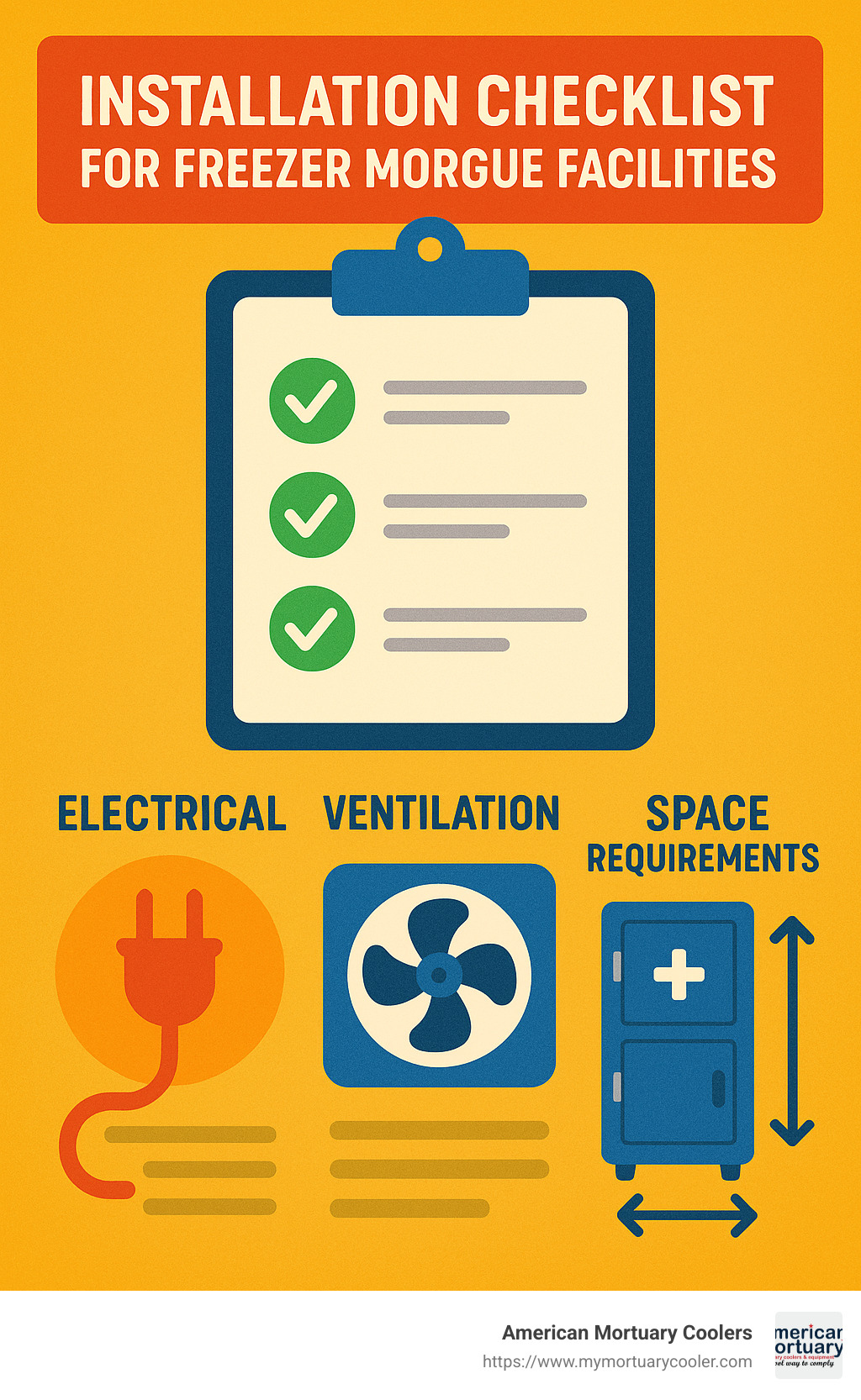
Before you commit to a particular freezer morgue, take time to evaluate your facility's physical space. You'll need adequate floor load capacity—especially for those larger units that can weigh thousands of pounds when fully loaded. Floor drains are essential for cleaning and defrosting operations, while proper electrical service (often three-phase power for larger units) ensures your system runs efficiently.
"We learned the hard way about the importance of ambient temperature control," shares a funeral director from Memphis. "Our freezer was installed in a space that got too warm in summer, causing the compressor to work overtime and eventually fail. A little extra ventilation planning would have saved us thousands."
Don't forget about access! We've seen too many facilities order perfect units only to find they won't fit through existing doorways or hallways. Measure twice, order once—that's our motto.
Key buying criteria
When shopping for your freezer morgue, focus on what truly matters for long-term performance and satisfaction:
Temperature precision should top your list—quality units maintain stable temperatures even with frequent door openings. Look for systems that can reliably hold between -10°C and -30°C without significant fluctuation.
Capacity planning requires honest assessment. We typically recommend adding at least 20% more capacity than you think you'll need. As one medical examiner from our Nashville service area told us, "We thought six spaces would be plenty, but within a year, we were wishing we'd gone with eight."
Safety features aren't optional extras—they're essential protections. Comprehensive alarm systems alert staff to high/low temperature variations, doors left ajar, and power failures. Remote monitoring capabilities give peace of mind after hours, while dual compressors provide crucial redundancy if one system fails.
The warranty tells you a lot about a manufacturer's confidence in their product. Our units include ten-year coverage on panels and one-year protection for refrigeration components because we stand behind our craftsmanship.
Energy efficiency might seem secondary, but it significantly impacts your operating budget over time. Higher R-value insulation and efficient compressors reduce long-term costs, especially for larger units that run 24/7/365.
Renting vs purchasing
Sometimes buying isn't the right answer—at least not immediately. Temporary needs call for flexible solutions, and renting a freezer morgue can make perfect sense in certain situations.
During facility renovations, renting provides continuity of service without long-term commitment. Similarly, disaster response scenarios demand rapid deployment without permanent infrastructure changes. Seasonal fluctuations in some regions may justify temporary capacity rather than year-round ownership.
Budget realities sometimes favor operational expenses over capital investments. As one small-town funeral home director explained, "Renting let us provide the service immediately while we built up the capital for eventual purchase."
That said, ownership offers clear advantages: lower long-term costs, customization options, and complete control over maintenance schedules. Plus, owned equipment becomes an asset on your books rather than an ongoing expense.
At American Mortuary Coolers, we've created flexible financing options for facilities throughout our service regions, making ownership accessible even when budgets are tight. We believe every facility deserves quality equipment, regardless of their immediate cash position.
Future-proofing & add-on racks
The last thing you want is to outgrow your freezer morgue shortly after installation. Smart planning now prevents headaches later.
Modular designs offer the best path to future expansion. When selecting your initial system, ask about panel designs that accommodate future size increases without complete replacement. One hospital in our Denver service area started with a six-body system and has expanded twice as their service community grew—all using the same core infrastructure.
Don't overlook the growing need for bariatric options. The reality is that Americans are getting larger, and having at least some capacity for oversized remains is increasingly necessary. Retrofitting for bariatric needs is much more expensive than incorporating this capacity from the start.
When floor space is limited, think vertically. Stacking kits and vertical storage solutions can double your capacity in the same footprint. Just ensure your facility has adequate ceiling height and that staff can safely access upper levels.
Smart refrigeration planning means selecting cooling systems with some excess capacity—perhaps 15-20% more than your initial configuration requires. This built-in headroom makes future expansion much simpler and less costly.
Flexible rack systems are worth the investment. Choose body rack configurations that can be reconfigured as needs change rather than fixed systems that limit your options.
For more detailed information about various freezer morgue types and their applications, visit our resource on Types of Morgue Freezers.
Operation, Maintenance, Compliance & FAQs
Running a freezer morgue isn't just about having the right equipment—it's about knowing how to care for it properly. At American Mortuary Coolers, we've helped countless facilities across the country maintain their equipment for peak performance and longevity.
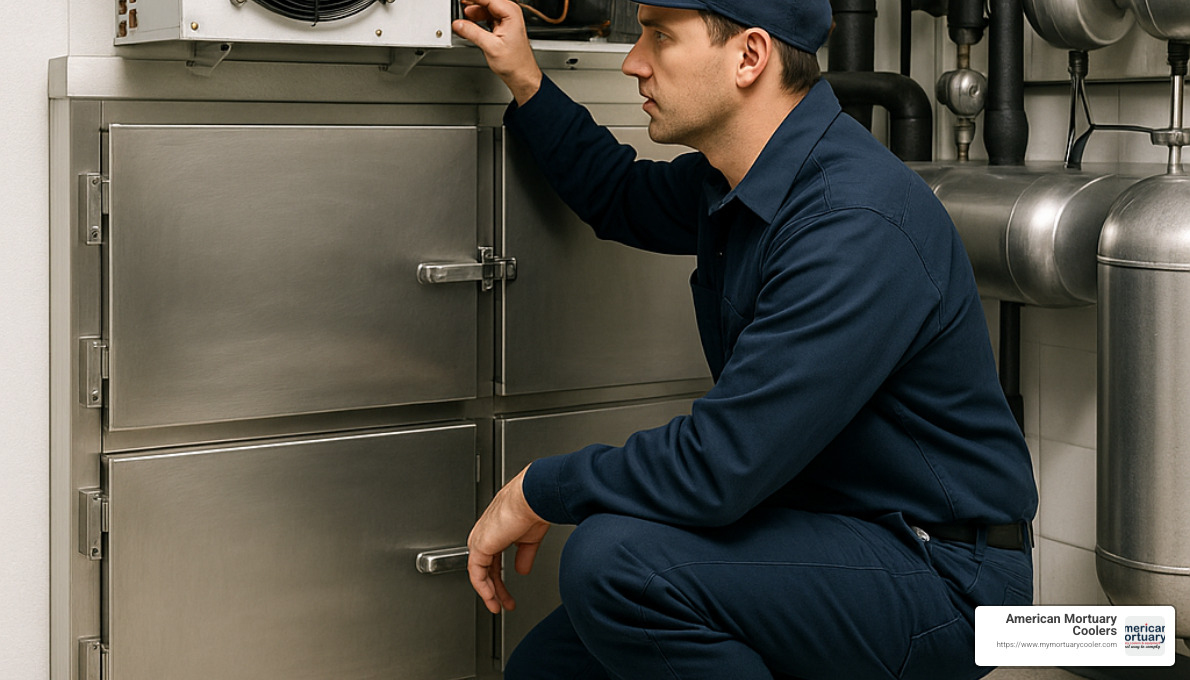
"Treating your equipment right means it'll be there when you need it most," explains our lead service technician. "We've seen units from Los Angeles to New York still running beautifully after 15+ years because their owners followed proper maintenance routines."
Daily operation makes a huge difference in how your freezer morgue performs. Little things matter—like keeping door openings brief and infrequent, following proper body wrapping protocols to prevent cross-contamination, and ensuring bodies are properly spaced for air circulation. One funeral director told us, "We keep a temperature log right by the unit and check it twice daily—it's become second nature and gives us peace of mind."
Cleaning shouldn't be overlooked either. Those stainless steel surfaces need gentle but effective disinfectants that won't cause corrosion. Pay special attention to door gaskets—they're often the first point of failure when not properly maintained. A weekly wipe-down prevents ice buildup that can compromise your seal and strain your cooling system.
Routine maintenance schedule
Think of your freezer morgue maintenance like caring for a car—regular attention prevents breakdowns when you least can afford them.
Weekly care is your first line of defense. Beyond cleaning those gaskets, take a moment to record temperature readings and check for any ice building up on the evaporator coils. This early warning sign can help you address issues before they affect performance.
Monthly checks should include a deeper look at your system. One mortuary manager from Johnson City, TN shared: "Every month, I take 15 minutes to inspect our condensate drain lines and clean the exterior condenser coils—it's saved us from several potential water damage incidents and keeps our unit running efficiently."
When it comes to quarterly maintenance, this is where professional help often makes sense. Temperature sensors need calibration, refrigeration lines require inspection, and all alarm functions should be thoroughly tested. Many of our clients have service contracts that include these quarterly visits.
The annual deep dive is non-negotiable for serious facilities. This comprehensive service includes checking refrigerant levels, evaluating compressor performance, inspecting all electrical systems, and a thorough cleaning of components that rarely see attention. "Our quarterly service contract has paid for itself many times over," noted a funeral director near our Tennessee headquarters. "They caught a small refrigerant leak that would have become an emergency repair during our busiest month."
Built-in safety & alarm features
Modern freezer morgue units are far more sophisticated than their predecessors when it comes to safety and monitoring.
Temperature alarm systems have become increasingly advanced, with high/low alerts that can notify staff through multiple channels when temperatures drift outside acceptable ranges. "During a power outage last winter, our cloud-based monitoring system alerted my cell phone at 2 AM," recalled a medical examiner from our Southeast Region. "I was able to activate our backup generator before temperatures rose to concerning levels."
Door-ajar monitoring has saved countless facilities from temperature excursions. The system detects when doors haven't fully closed and triggers an alarm after a predetermined time—especially valuable when staff members are rushing during busy periods.
Battery backup for critical alarm functions provides up to 72 hours of protection during power outages. This feature has proven particularly valuable in hurricane-prone areas of our Southeast and Southwest regions, where extended outages can occur.
The redundant cooling systems in premium units offer peace of mind through dual compressors. If one system fails, the second takes over automatically, maintaining preservation integrity until repairs can be made.
Regulatory checklist
Navigating regulations around freezer morgue facilities doesn't have to be overwhelming. Here's what you need to know:
All body-contact surfaces must meet NSF (National Sanitation Foundation) standards for cleanability and non-porosity—similar to food preparation equipment. These standards ensure surfaces can be properly disinfected between uses.
Electrical components need UL (Underwriters Laboratories) listing to certify they meet safety standards. This protects both your facility and staff from electrical hazards.
Energy efficiency matters too—not just for your utility bills but for compliance. The Energy Independence and Security Act of 2007 (EISA-2007) sets specific standards that walk-in freezers must meet.
OSHA workplace safety requirements include emergency release mechanisms inside walk-in units, proper ventilation in equipment rooms, and clear safety signage. "We install safety releases that exceed OSHA standards," notes our installation team leader. "They're designed to be operable even in low-light conditions."
State-specific regulations vary widely, which is why American Mortuary Coolers provides documentation packages with all installations. These help you maintain compliance with your local requirements without having to become a regulatory expert yourself.
Frequently Asked Questions about Freezer Morgues
How cold should a freezer morgue be set?
Most freezer morgues operate best between -10°C and -20°C (14°F to -4°F) for standard preservation needs. This temperature range effectively halts decomposition processes while balancing energy efficiency.
"Different facilities have different needs," explains our technical director. "Forensic facilities often prefer the lower end of the range, around -18°C, while funeral homes might run slightly warmer at -10°C to -15°C for short-term storage."
Your facility should have written policies specifying standard temperature settings based on your specific preservation requirements, expected storage duration, and manufacturer recommendations. These policies should also include monitoring procedures and response protocols for temperature deviations.
How many bodies can a typical unit hold?
Capacity varies significantly across freezer morgue types:
Upright cabinet units are perfect for smaller facilities, typically holding 1-6 bodies depending on the model. They're ideal for funeral homes with occasional need for extended preservation.
Standard walk-in units usually accommodate 8-20 bodies and represent our most popular option for mid-sized funeral homes and smaller medical examiner offices.
Large-scale walk-ins can handle 20-50+ bodies when configured with efficient rack systems. These are typically found in major metropolitan medical examiner offices or disaster response centers.
A facility director from our Midwest Region shared: "We initially thought a 12-body unit would be sufficient, but American Mortuary Coolers helped us analyze our actual needs. We ended up with a 16-body system that's proven perfect during our seasonal capacity fluctuations."
Do I need a freezer morgue or a refrigerator?
This common question depends on your specific circumstances. Choose a freezer morgue when preservation needs extend beyond a week or when you're dealing with situations requiring forensic evidence preservation. Freezers are also the right choice in warmer climates where standard refrigeration may struggle to maintain consistent temperatures.
Refrigeration works well for short-term storage (typically 3-7 days) when you expect quick turnover. Many smaller facilities prefer refrigeration for its lower initial cost and reduced energy consumption.
"We often recommend combination units for growing facilities," notes our sales director. "They provide both refrigeration and freezer compartments in a single unit, giving you flexibility as your needs change."
Climate considerations matter too. Facilities in our Southeast Region often opt for freezer capacity even for shorter-term storage due to the challenges of maintaining consistent refrigeration in high-humidity environments.
The bottom line? Your specific timeline, climate challenges, and budget all factor into making the right choice. At American Mortuary Coolers, we help facilities throughout our service areas find the perfect balance between refrigeration and freezing capabilities based on their unique requirements.
Conclusion
Choosing the perfect freezer morgue solution is a bit like finding the right partner – it needs to meet your specific needs while being reliable for the long haul. Here at American Mortuary Coolers, we take pride in creating custom, durable solutions that perfectly match each facility's unique requirements, whether you're in sunny Florida or snowy Minnesota.
When you invest in the right freezer morgue system, you're doing much more than just purchasing refrigeration equipment. You're securing peace of mind through reliability, ensuring compliance with complex regulations, and most importantly, providing dignified care for the deceased and compassionate service to their families during difficult times.
From our home base in Johnson City, Tennessee, we've built a reputation for excellence across the country by focusing on:
- Thoughtfully designed custom freezer morgue systems that address your specific challenges
- Forward-thinking modular solutions that can grow alongside your facility
- Hassle-free delivery directly to your doorstep anywhere in the lower 48 states
- Responsive, knowledgeable service and support when you need it most
- Comprehensive compliance with all relevant industry regulations
You might run a small family-owned funeral home in Iowa, manage a busy county medical examiner's office in California, or oversee a teaching hospital in Texas – whatever your situation, we have freezer morgue solutions custom specifically for you.
We understand budget realities too. While it might be tempting to choose the least expensive option upfront, selecting the right unit initially often translates to significant long-term savings through better energy efficiency, fewer maintenance headaches, and a much longer service life. And if budget constraints are a concern, our flexible financing options make quality freezer morgue systems accessible even when capital funds are limited.
"The freezer morgue unit we purchased from American Mortuary Coolers paid for itself within three years through energy savings alone," shared a funeral director from Pennsylvania. "Not to mention the peace of mind from knowing we have a reliable system we can count on."
Ready to explore your options in greater depth? Visit our comprehensive resource on American Mortuary Coolers: the leading supplier of morgue coolers and forensic refrigeration for detailed specifications and customization possibilities.
Reach out today and let's have a conversation about how we can help you select, install, and maintain the perfect freezer morgue solution that meets your facility's unique needs – because in this business, quality and reliability aren't just nice-to-haves, they're absolute necessities.
















